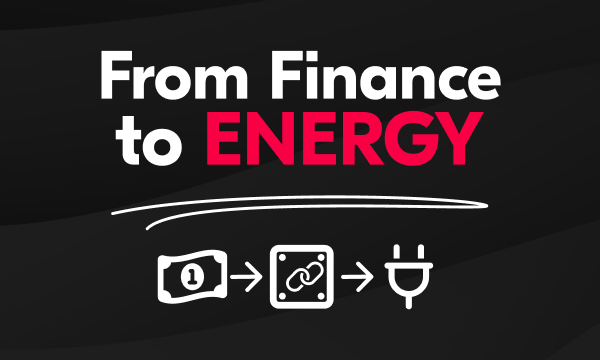Blockchain use cases in fintech have taken the world by storm. The popularity of blockchain keeps on growing. By 2018-2022 many European and North American banks were exploring the technology and how to leverage it. Financial companies spent around $552 million on blockchain projects globally. But, what is this technology exactly, and which blockchain usability will change the face of banking and finance?
This article will provide you with simple answers to both these questions and share different examples of blockchain ecosystems influencing global finance.
Table of contents:
- What is blockchain technology, and how does it revolutionize the financial services sector?
- Decrease transaction costs
- Resolve identity theft issues
- Global payment options
- Enhanced regulation and auditing
- Credit reports
- Lending as a way to gain budget or to invest
- Financial instruments trading
- Conclusion to blockchain application in fintech
What is blockchain technology, and how does it revolutionize the financial services sector?
Blockchain technology is a data management system using complex cryptography to power many cryptocurrencies and other decentralized applications. At their core, blockchains are accounting systems and digital ledgers that facilitate auditing. What makes them different from traditional databases is that they distribute up-to-date versions of ledger data to all the devices on the network. This makes it nearly impossible to change the information once it’s on the blockchain network as all the devices in the network would have to accept the changes i.e. in the voting process.
One of the first times blockchain was used, its product was Bitcoin, which facilitates digital money transfers and has no central authority, such as a central bank. The protocol uses the computing power of all the devices — called mining — in the network to add new data to the chain and rewards miners with bitcoins.
The complexity of the system makes it resistant to hacking as someone would have to take control of the 51% or more of the computing power of the network to do it.
Later, Ethereum emerged and introduced smart contracts, making this blockchain more useful for business needs like financial markets.
Blockchain has many applications in real-life financial services. PWC revealed in a 2017 report that 77% of fintech companies expect to involve it as a part of their systems. Forbes summed up the 50 most significant 2022 projects and mentioned many in the fintech sector.
Fintech companies are moving towards this new trend for several reasons, including the following.
Decrease transaction costs
An online transaction has multiple elements that you have to consider. There are trading companies or applications, transfer channels, as well as some intermediaries who slow down the process and introduce some extra charges to it. The costs rise even more for international dealing.
A study by McKinsey says that remittance companies are making $40 billion per year with these fees. Blockchains can decrease all these losses. Blockchains enable direct peer-to-peer (p2p) transactions over the internet, which eliminates the intermediaries and their costs. The decentralized system also eliminates delays in online payments. Their real-time data updating feature further ensures smooth, error-free operations and prevents extra charges or lost investments.
Resolve identity theft issues
A press release by Javelin shows that 6.64% of consumers became a victim of identity theft in 2017. Since then, digital fraud and identity theft issues were made even more painful, especially during the pandemic.
Banks and fintech firms are required to implement know-your-client and anti-money laundering procedures following increased oversight. Of course, this means they need a lot of paperwork which slows their processes. It can take weeks to verify the identity and complete an online transaction. The lengthy and non-standardized paperwork of these verifications further adds to the problem.
Therefore, financial institutions are increasingly open to implementing a blockchain-based system. In this system, the user has to prove the identity only once. After that, they are given a verification document that they can use to conduct transactions from any part of the world. They can also use this document to manage and share personal data, log in without a password, and e-sign any document.
Global payment options
The blockchain network is entirely internet-based and doesn’t need any specific setup for operation. Thanks to the digitization of assets, users can access the data and conduct transactions from any part of the world using their account’s public and private keys.
Its internet-centric system also makes it flexible for global transactions. In fact, the 2016 Statista study about blockchain usage opportunities amongst financial institutes reveals that about 60% of the total blockchain-based transfer of digital assets involved cross-border transactions.
Enhanced regulation and auditing
With increased financial connectivity across the world, the demands for regulatory services are also growing. Companies will need better and more advanced fintech systems to deal with the demand, and that’s where blockchain solutions come to play.
Blockchain applications use a decentralized system that creates new storage areas for every new action but never tampers with the old blocks. It also maintains a non-deletable report of the transaction related to your blockchain. The system also saves the original document of the trade that the users can view at any time.
Moreover, blockchain provides all the data and analysis reports at one single source, which is beneficial for auditing. Its smart, read-only nodes decrease the time and the cost required for verification and accounting.
Credit reports
Banking & financial institutions often store the transactional information of their users to analyze their monthly transactions. They use this data to analyze the credibility of the users and prepare their credit reports. However, they mostly use a centralized server or system for this job, which is a huge security risk. Anyone who can hack into the server can get complete access to the private data of all users.
Blockchain-based systems are different and more reliable in this case. They decentralize the information and use separate storage spaces to protect the data. It also deploys robust security algorithms and identity verification protocols that further enhance the level of security.
The best part is that they can also help to audit these credit reports at a much higher speed than the traditional system.
Lending as a way to gain budget or to invest
Traditional credits and loans are not accessible for some businesses, while they may still require cash flow to expand or start performing efficiently. It is valid for some fintech startups or e-commerce companies. On the other side, groups of small investors are looking for a way to invest without much work and unnecessary risk.
Blockchain tools, especially smart contracts, are a way to match investors with individual borrowers. The technology provides a way to transfer assets, sign deals with terms transparent to both sides and finally automate debt management and execution. Blockchain mitigates risks on both sides and gives a chance to investors and borrowers that are omitted in the traditional finance system.
Financial instruments trading
Cryptocurrencies and NFTs are investment options, but that is not what this case is about. Blockchain networks, often private enterprise ones, have been changing the way financial assets are traded for years. The process requires approvals, audit trails, and accessibility for many pre-verified roles like financial brokers or advisors.
All of that is done by each unit taking part in the process separately. Blockchain is one virtual place where those businesses meet with full accountability and transparency of actions. Solutions for financial clearing services are cutting times and errors by more than half.
Conclusion to blockchain application in fintech
Blockchain use cases in fintech are revolutionizing the finance industry. The benefits of blockchain are clear as it has removed the barrier of speed, cost, and many more factors of financial transfers. It can provide you with real-time database management, financial tracking, resource management, and a lot more.
This future tech can even enhance the security level of your financial institution and work as a defence against identity theft issues. These advantages are noticed by large banks like HSBC, Deutsche Bank, and KBC are using this technology to maintain the reliability of their services.
Blockchain platforms are the future of finance, not only for cryptocurrency users but also for FIAT currencies, a trend that is driving massive business. That is why many organizations are looking for a way to use blockchain to be a part of it.
Related posts:



